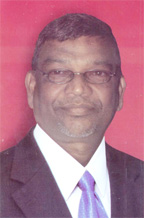“For far too long we’ve had dishonest acts carried out by the leaders of co-ops. We’ve had cases whereby members fail to report these matters, such as ensuring an audit report is presented, and it is at that point the Chief Co-operatives Development Officer and his staff will intervene,” Minister Gopaul said in delivering remarks at the National Co-operative Week Rally and Exhibition at the Guyana International Conference Centre, Liliendaal.

He also referred to instances where wealthy people lured the leaders of some co-ops and took over lands, which he noted was in violation of the rules.
“We are examining those issues and we’re coming down very hard on those executive members who violate the rules and who pay very little regard to the management of their co-operatives. We will let the law take its course where illicit transactions take place,” Dr Gopaul disclosed.
He noted that in Guyana there are in excess of 1,800 co-operative societies and 976 are functioning very well. Of these, 276 are School Thrift Co-operative Societies.
In addition, the minister said there are 1,200 friendly societies that are governed under the Friendly Societies Act but there are also 400 defunct co-operative societies, some of which are in possession of land and other assets amounting to millions of dollars.
“We will have to monitor these defunct societies to ensure that people’s assets are not compromised,” he stated.
Dr Gopaul was speaking against the background that the local co-op movement is responsible for an aggregate turnover of about 15 billion dollars in assets. He noted that if those assets are properly used, they can be of tremendous benefit to the members.
The rates of the co-ops are set especially in comparison to that of the other lending institutions, he explained, and it is set at a very competitive level so when members borrow from their own funds they benefit from a very low interest rate that is most times lower than commercial banks.
“That’s why we should strive to benefit from what we put in into the co-op movements,” Dr Gopaul added.
He said further that “the Government of Guyana would not like to have a role in the people’s movement. We would like to stay out, but as a regulatory body under law the Co-op Department will play a very interesting and active role in ensuring that the co-op movement serve their members and that they abide by the rules and objectives.
Prudent management would be the hallmark of our supervision and regulation of co-operatives since bad management on the part of elected officials and non-participation of members in co-operative societies, have caused tremendous damage to the image of the co-operative movement.”
The Labour Minister maintained that co-operatives must be allowed to function democratically within the laws and guiding principles and he emphasized that the “government will take a firm stand to arrest the situation and deal condignly with persons who engage in illicit activities.”
He also highlighted that his ministry recognizes the significant role co-operatives can play in promoting both economic and social development.
“Co-operatives, as social economic enterprises and self-help organizations have demonstrated that they have a meaningful function in uplifting their members and their local communities.”
Concerns
However, Dr Gopaul expressed concerns about the action of some executive members of co-operatives who are “trying to have independent titles, particularly for the land co-operatives.”
“There is nothing wrong with this process provided that all the procedures are complied with and the rules and principles governing co-ops are observed.”
He also acknowledged that “several societies look to the Co-ops Department for answers to their plea for resuscitation, solution to internal conflict, effective utilization of resources and other needs – some practical, some near very challenging, some impossible to accomplish mainly because of the human factor involved.”
Gopaul said that the ministry, while addressing a long-term strategy to move the sector forward as a whole to make it relevant to a new economy as outlined by the National Development Strategy and the National Competiveness Strategy, has had to “attend to burning issues of some societies to avoid their own self-destruction.”
“The introduction of Interim Management Committees to perform short to medium term surgeries to these ailing societies have been criticized by some as undermining the spirit and principles of co-operatives, but this arrangement was undertaken to halt the downward and uncontrollable spiral that was leading to their demise.”
These Interim Management Committees, he assured, should not be seen as established long-term bodies, but ones which should have a definite time frame to allow for elections and installation of new elected bodies to continue to manage the affairs of these societies.
Gopaul also observed that since he became minister, he has been involved in efforts to address several issues relating to co-operatives, particularly those relating to land, where members’ rights are violated and their land taken and membership brought to an end on flimsy grounds.
This situation poses serious challenges to the membership of co-operatives, the ministry of labour and the state, as the executives flout rules and known principles of co-operatives and engage in undesirable conduct, Gopaul pointed out.
However, as the minister responsible for co-operatives he declared that he would be happy to see at the end of ‘International Year of Co-operatives’ practical proposals for the state to once again play a meaningful role in guiding co-operatives into a sector of significance in the economy of Guyana .








